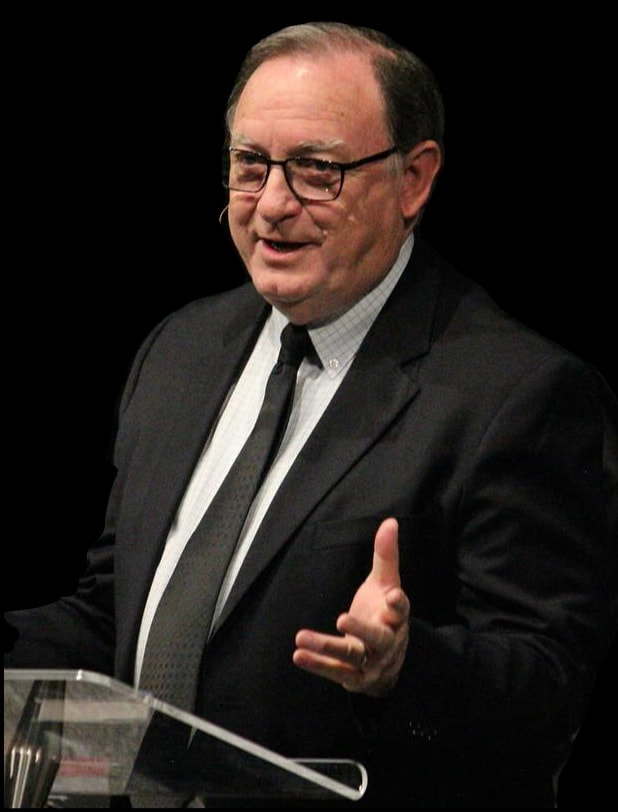AuthorTerry R Baughman is Lead Pastor for LifeChurch in Gilbert, AZ. See his complete bio at trbaughman.com Archives
July 2024
Categories |
Back to Blog
Established on Better Promises9/27/2020  Established on Better Promises Living by Faith Terry R. Baughman “But now He has obtained a more excellent ministry, inasmuch as He is also Mediator of a better covenant, which was established on better promises” (Hebrews 8:6 NKJV). Who could be more trustworthy than Jesus Christ when He makes a promise? What contract or covenant could have more validation than that which was written in blood and affirmed by the Word of God? In a politically divisive climate, especially during an election of a President, the environment becomes toxic as all sides are attempting to activate voters and swing the undecided in their favor. Many resort to fabricated stories, unfair practices, and smear campaigns or outright lies to convince the voters that they are the better candidate. The result of such practices is increased cynicism and it sometimes causes voters to become more divided or more apathetic toward the whole process. Many concluded that all politicians are crooked, corrupt, and liars. Unfortunately, that may not be far from the truth! When the preacher or teacher begins to talk about a more reliable witness, someone who keeps their promises, and something better than what we have previously observed, it is a difficult sale. We want to believe it, but we have been deceived for so long we find ourselves among the skeptics that suspect another con and a shaded story. Jesus came as the mediator of a better covenant and better promises! When we hear the title mediator we may think of a negotiator, someone who accepts a compromised position in order to close the deal or bring two sides together. Jesus was different. He was not negotiating with Satan or bargaining with evil for the souls of humanity, rather He was bridging the gap between God and man. Paul wrote, “There is one God and one Mediator between God and men, the Man Christ Jesus, who gave Himself a ransom for all” (1 Timothy 2:5–6). Jesus was God in flesh, “God was in Christ reconciling the world to Himself” (2 Corinthians 5:19). The writer of Hebrews declared that Jesus, “obtained a more excellent ministry” (Hebrews 8:6). He was superior to the patriarchs and prophets. He came with the divine mandate to establish a better covenant. How could he do that? He was constructing the New Covenant upon the foundation of better promises. Paul said, “God will always be proven faithful and true to his word, while people are proven to be liars” (Romans 3:4 TPT). In another letter he said, “For all the promises of God in Him are Yes, and in Him Amen, to the glory of God through us” (2 Corinthians 1:20 NKJ). We have confidence in God’s New Covenant because we know His promises are true. God has never made a vow that He cannot fulfill. He has never made a promise He did not intend to keep. When Jesus took the cup and drank the fruit of the vine with His disciples He gave special significance to the act. He said, “This cup is the new covenant in My blood, which is shed for you” (Luke 22:20). It was not possible for them to understand the power of that statement until a few hours later when He was hanging on a cross, atoning for our sins through the sacrifice of His blood. This message has authority and power because it is established on better promises! Theme passage: “All these people were still living by faith when they died. They did not receive the things promised; they only saw them and welcomed them from a distance, admitting that they were foreigners and strangers on earth” (Hebrews 11:13).
0 Comments
Read More
Back to Blog
Empowered with a Better Hope9/20/2020  Empowered with a Better Hope Living by Faith Terry R. Baughman “For the law made nothing perfect; on the other hand, there is the bringing in of a better hope, through which we draw near to God” (Hebrews 7:19 NKJ). A world without hope is disposed toward disappointment and despair. There is a hopelessness that pervades the attitude of our country and people grasp for any proposed change that promises consolation or offers a resolution of expectation. Frequently, it is grasping at straws of vain optimism and empty promises. True hope is only found in a relationship with Jesus Christ. Jesus came with the goal of bringing salvation to a world that had been alienated through the consequence of sin and the condemnation of death. Jesus said, “I have come that they may have life, and that they may have it more abundantly” (John 10:10). He prepared and proclaimed the gospel, physical healing, spiritual deliverance, and a dispensation of grace. (See Luke 4:18–19.) The good news of the New Covenant was the institution of a better hope. The Gospel of Jesus Christ promises hope to all who believe and receive His Spirit. Paul said, “Now may the God of hope fill you with all joy and peace in believing, that you may abound in hope by the power of the Holy Spirit” (Romans 15:13). He is the God of hope and He has come into our world to bring that hope to us! The hope that God brings is a better hope because there is no disenchantment in His promises. Paul wrote, “Now hope does not disappoint, because the love of God has been poured out in our hearts by the Holy Spirit who was given to us” (Romans 5:5). The hope of salvation has already been realized through the power of the Holy Spirit. We continue in hope for the future fulfillment of God’s purposes. Paul said, “Hope means that we must trust and wait for what is still unseen. For why would we need to hope for something we already have? So because our hope is set on what is yet to be seen, we patiently keep on waiting for its fulfillment” (Romans 8:24-25 TPT). The Book of Hebrews emphasizes the certain hope, the better hope, with which we have been empowered. The certainty of that hope is assured by the unchanging character of God and declaration of His promises. The writer declared, “It is impossible for God to lie for we know that his promise and his vow will never change! And now we have run into his heart to hide ourselves in his faithfulness. This is where we find his strength and comfort, for he empowers us to seize what has already been established ahead of time--an unshakeable hope! We have this certain hope like a strong, unbreakable anchor holding our souls to God himself. Our anchor of hope is fastened to the mercy seat which sits in the heavenly realm beyond the sacred threshold” (Hebrews 6:18–19 TPT). God has provided something far superior than the flimsy security of human promises in the face of our present circumstances. We have a better hope in Christ and, “This hope we have as an anchor of the soul, both sure and steadfast” (Hebrews 6:19 NKJV). Theme passage: “All these people were still living by faith when they died. They did not receive the things promised; they only saw them and welcomed them from a distance, admitting that they were foreigners and strangers on earth” (Hebrews 11:13).
Back to Blog
Looking for Better Things9/13/2020  Looking for Better Things Living by Faith Terry R. Baughman “To the general assembly and church of the firstborn who are registered in heaven, to God the Judge of all, to the spirits of just men made perfect, to Jesus the Mediator of the new covenant, and to the blood of sprinkling that speaks better things than that of Abel” (Hebrews 12:23–24 NKJV). When a violent murder occurs and there are no suspects or leads to apprehend those who are responsible, family members and friends champion the cause for justice. They may offer rewards for information, seeking to bring the perpetrators to answer for their crimes. Other people cry out for justice when they feel that someone's rights have been violated. The mistreatment of a victim or a perceived civil rights infraction can cause hundreds to rally for justice. The quest for social justice will never end, for in our world there will always be those who will oppress the weak and exercise power over those who cannot defend themselves. Abel was overpowered by his angry brother, Cain, and became the object of the first murder in the Bible. God pronounced judgment on Cain declaring, “The voice of your brother’s blood cries out to Me from the ground” (Genesis 4:10). The gospels refer to the “blood of righteous Abel,” announcing a particular justice for the death of an innocent man. (See Matthew 23:35 & Luke 11:51.) The bookends of Old Testament justice extended from righteous Abel to Zechariah, son of Berechiah, whom was murdered between the temple and the altar. Whenever we see social inequities, natural calamities, and human tragedies we are made to question whether there is anything fair in our world. Why is it that the evil seem to lead a trouble-free existence and another moral and trustworthy citizen falls prey to a plethora of losses, tragedies, and personal conflict? We may ask, “Where is the justice in all of this? Why do these things happen?” Then we may sigh and say, “It just doesn’t seem fair!” Justice is only found in a belief that God is just and He will always be fair. God is sovereign and reigns supreme over all the earth. However, much of what happens on earth is a result of sin and the consequence of humanity’s disobedience. God will always be just and justified in whatever He does. While he may allow the course of natural events, we know that ultimately all will stand before God and when the books are opened everything will become clear. Our only hope is in Christ Jesus. His sinless life and spotless sacrifice provided access into the “better things” that God has prepared for us. The blood of Christ sanctifies us from sin and connects us with redemption. Through His sacrifice we are united with Christ have the hope of everlasting life. We don’t have to be the ones who bring justice for everyone who ever lived and try to right the wrongs of every sinner. Rather we come to Jesus in our sins and ask for His forgiveness and receive the promise a new life and peace that comes only from Him, our Savior. Jesus’ blood and the New Covenant speaks of better things for us, more righteous than Abel or Zechariah, more worthy than any good thing that any holy one has ever accomplished. Our hope is in Christ alone! In Him we are looking for better things! Theme passage: “All these people were still living by faith when they died. They did not receive the things promised; they only saw them and welcomed them from a distance, admitting that they were foreigners and strangers on earth” (Hebrews 11:13).
Back to Blog
Longing for a Better Country9/6/2020  Longing for a Better Country Living by Faith Terry R. Baughman “If they had been thinking of the country they had left, they would have had opportunity to return. Instead, they were longing for a better country—a heavenly one” (Hebrews 11:15–16 NKJV). Abraham was called to leave home before he had ever seen where he was going. Apparently, he had a relationship with God from his youth, so when God spoke to him to leave his father’s house in Haran and journey into the land of Canaan he was ready to make preparations to go. When we are challenged to select a travel destination, we are rather spoiled in that we have color brochures, YouTube videos, and our research assistant, Google, to find out all the information we want, along with full color pictures of most any location we might select. We would want to check the mileage and the best route to travel through our map app. We might even check Yelp to find the best restaurants and hotels along the way and compare their reviews. Sadly, our ability to get all this information in advance takes some of the “living by faith” element out of our Christian walk. If we know where we are going and have already downloaded the most popular attractions for our journey, where is the need for faith or the uncertainty of the adventure. How can we learn to trust in God when we can find all the answers for ourselves. Of course, there can still be surprises that arise and detours along our journey. These should not be viewed as an annoyance, but rather an opportunity to find that God had planned this little unexpected event and He has the ability to make it a learning experience for our good! Hebrews chapter 11 is often referred to as the “faith hall of fame” in the Scriptures. Many of those listed in this chapter are well-known among the patriarchs and prophets. The writer sometimes pulls the difficulties they faced into the forefront to see that these challenges were actually wonderful opportunities to learn more about God. When we set out to teach a course or a series of lessons, the best thing we can do is take the time to review the lessons and learn the outcomes for ourselves. Those featured in Hebrews 11 were imperfect people with the ability to rise above their doubts and fears and embrace the unknown element of faith. Faith is the essential quality that enables us to connect with God. Without it we cannot please God and will never enter into a relationship with Him. The writer of Hebrews warned, “Without faith it is impossible to please Him, for he who comes to God must believe that He is, and that He is a rewarder of those who diligently seek Him” (Hebrews 11:6). To those listed in this chapter, God gave a vision of a place they had never seen, and they set out to find it. Many grew old or their life was cut short before they realized that they had not yet arrived and the destination was still out of reach. It seems inconclusive and unkind to end the journey before the traveler had the opportunity to complete his route, but in truth all dreams should be bigger than our ability to grasp and every destination should be beyond our map and just out of reach. That way we never stop trying and never quit reaching. We all are longing for a better country and a heavenly city. We have God’s word to direct us on the right path! Here is our challenge, “Now faith brings our hopes into reality and becomes the foundation needed to acquire the things we long for. It is all the evidence required to prove what is still unseen” (Hebrews 11:1 TPT). Some things we desire are beyond the horizon and may only be seen in heaven, but we can still seek them. Theme passage: “All these people were still living by faith when they died. They did not receive the things promised; they only saw them and welcomed them from a distance, admitting that they were foreigners and strangers on earth” (Hebrews 11:13). |


 RSS Feed
RSS Feed